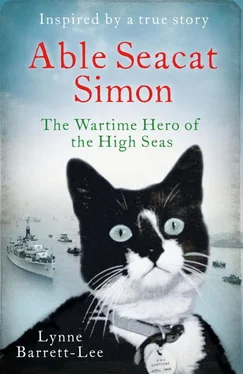Captain Kerans had the men fall out then, and despite the morale-boosting words, it was clear that the reality of our capture was beginning to sink in, and the mood quickly dipped again. I could see it in the slump of shoulders as the crew dispersed, in the low mutterings of discontent that floated up to me and Peggy.
I could mostly sense the growing anger, which was wholly justified, that the Amethyst was being pinpointed as the aggressor. That to admit to an outright lie would be a condition of us being freed, just to save the face – and perhaps the bacon – of a communist soldier who’d done wrong. And that anger was good, I thought. Fortifying and good. It would give the men a much needed reason to stay strong.
But it seemed Captain Kerans had been right when he’d used the words ‘agonisingly slowly’. A week passed and then another, and a new routine became established; one of hard physical work to keep the Amethyst in peak condition, which meant maintenance and cleaning and drills for the men, and round-the-clock rat-hunting for me. And while we got on with the business of managing our silent, stranded ship, the officers would be back and forth across the Yangtse in a communist sampan, back and forth, back and forth, all done up in their whites – to meetings with the communists, which always promised much but in every case failed to deliver.
The weather was a constant irritant too. The temperature rose and kept rising, but more often that not, there was no pleasure to be had from it. ‘There’s just too damned much weather!’ Frank was moved to comment one day, as we were treated to lashings of rain and winds strong enough to blow a man right off his feet (let alone a cat) alongside the inevitable soaring temperatures, dense, swirling mists, and humidity so high it made everything wringing wet anyway. ‘Can’t we just have one ruddy type at a time?’
And then, perhaps inevitably, came the news from the captain that in order to preserve the precious stock of oil we still had, the boilers would be shut down at night. This left nothing but the emergency lighting to rely on, and also meant there was no ventilation.
The news was greeted with grim acceptance, as the anger still held sway. They would not beat us. However hard they conspired to make life difficult for us, the truth was the truth, and every man was going to stick by it. To collude with their lies would be to betray our dead friends, so they could do what they liked.
Naturally, the rats were thrilled to bits.
By mid-June, the temperature on board was becoming unbearably hot. By day it was in the hundreds and by night, not much cooler, and with the oil situation critical and no guarantee of getting more, the boilers remained shut down and silent every night, making the Amethyst as quiet as the grave.
It was strange and unsettling. A ship was a living, breathing thing. Whether at sea or in port, it was never meant to be completely silent. I knew this from my days as a kitten in Hong Kong. I would be mesmerised at night, often, by the big ships in the harbour – always lights showing, bells and whistles, the low chug and throb of all the engines and boilers, sailors running around everywhere, blurs of navy, flashes of white – seeming to crawl over the infrastructure like ants. This silence was different. It was complete and unbroken, and it was only now I felt it that I realised how peculiar it was.
I suspected the silence was the last thing on my friends’ minds. Just the heat, and the humidity, and the inability to sleep; so much so that little by little, the sleeping arrangements changed. Forced to swelter and sweat through the long sticky nights, many would often give up their hammocks and sleep on camp beds out on deck.
Sleeping on deck became popular for other reasons too; the fact that the ship – now such a hothouse, due to the necessary lack of ventilation – was becoming infested with insects. Mosquitoes hid everywhere – they were extremely good at hiding – and stalked their prey with commando-like precision. I was lucky, as was Peggy – they had no interest in us – but the men were plagued constantly, many of them covered in angry-looking bites, and driven to distraction by the constant itching of them.
There was also a big increase in the cockroach population. Where toying with a cockroach had once been a happy diversion for me, there were now so many running around that I scarcely registered them, even when they twitched my finally sprouting whiskers. Where the rats had their runs, so the cockroaches did too, though where the rat runs followed routes behind pipes and under furniture, the cockroaches – nimble, quick, and entirely without limits – would scuttle along bedsteads and hammock ropes and pillowslips, and if a human got in the way they’d just scuttle straight over them, their antennae waving gaily as they passed.
It was an education in the curious sensibilities of humans; I knew cockroaches were high on the doc’s list of ‘health crises in the making’ because, like rats, they spread diseases. But it turned out the sailors didn’t care about that. No. In the main, they were just very, very frightened of them. There was no logic in this. Not that I could see, anyway. Yet the sight of a cockroach would have the biggest, burliest seaman shuddering – especially the younger ones – and I wasn’t sure they knew why themselves. But what was very clear was that they found it impossible to ignore them. If they weren’t jumping up and down on them – though never in bare feet – they’d be springing up, going ‘aagh!’ and ‘yuck!’ and ‘ruddy bleeders! Yarggg!’, shaking themselves down as if they were crawling with scores of them, rather than just one, and doing strange little dances on the spot.
There was an entirely different attitude towards the moths. Strangely, given that moths were far superior when it came to flying (and often sat for minutes at a time on the men’s faces, when they dozed off, if only they knew) they attracted nothing like the same frantic response. A moth was looked upon benignly, brushed away relatively calmly – though as the weeks passed and the heat grew their numbers began increasing, the cry of ‘Cover that ruddy light off – we’ll be swamped with the bloody things!’ became a common one.
But it was the rats – always the rats – who were posing the worst infestation, and by mid-June – six whole weeks since we’d been taken hostage by the communists – there was little choice but to stop using the aft part of the ship entirely, and let the rodents have the run of the place.
As a consequence, the men were even more crammed together in the heat and, when not working or on watch (Captain Kerans was becoming infamous for his ‘obsession’ with keeping everyone occupied) attempted to amuse themselves not only by reading, or playing cards (or, touchingly, writing long letters that couldn’t be posted) but by thinking up ways the evil scourge could be exterminated. Whenever the opportunity arose, boots were lobbed at any rat who was bold enough to run around in daylight.
These days, such boldness was common to most of them, and all I could do was my best. But it was fast becoming an unequal battle. I made kills every day now – rats were there for the taking – but for every one I finished off there seemed to be a dozen more.
‘Breeding like rabbits!’ Sid observed one evening, after the meal was cleared away. ‘We’ll soon be overrun with the wretched things!
Sid, the youngest rating, had recently become a particular friend. To add to the woes already heaped on us by the communists, he’d suffered an injury a few weeks back when trying to adjust a steel cable. When he’d been taken ashore by the doctor, it was discovered he’d broken his arm, so he’d been in need of a little extra help and comfort.
Читать дальше












